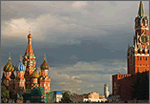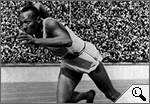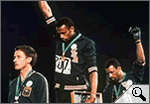|
|
|
 |
 |
 > 1936: from Berlin to Barcelona > Black Power in Mexico 1968 and Tragedy in Munich 1972 > The Boycotts in Moscow and Los Angeles dimarts, 15 d'abril de 2008
Held every four years, the Olympic Games is the most important international sporting event in the world. Its significance has meant that, at times, the Games have become a reflection of political and ideological conflicts, a platform for protests and boycotts.
In recent weeks we have seen how the Olympic torch, on its journey to the Chinese capital Beijing (host to this year's Games), has been obstructed in cities such as London, Paris and San Francisco. The reason: protests against the occupation of Tibet and the repression carried out there by the Chinese, and also, on a more general level, against the human rights situation in China, a country that is open to capitalism but that is ruled with an iron fist by the Chinese Communist Party. The protests, fomented by human rights organisations and aided by new technologies (enabling people to organise themselves easily) have led political leaders to make comments. For example, the French president, Nicolas Sarkozy, has said French attendance of the opening ceremony depends on the situation in Tibet; the German Chancellor, Angela Merkel, and the British prime minister, Gordon Brown, have said they will not attend the opening ceremony (whilst stressing that they are not intending to boycott the Games); and the Democratic Party candidates for the US presidency, Hillary Clinton and Barack Obama, have urged the president, George Bush, to consider the possibility of not going. And, the president of the International Olympic Committee (IOC), Jacques Rogge, has reminded China that it made a commitment to respect human rights. Over the years, a number of political events have changed the history of the Olympic Games.
1936: from Berlin to BarcelonaIn 1936, the Nazis wanted to turn the Olympic Games into a propaganda tool for their racist theories. Things did not, however, turn out as planned: the great hero of the Games was the Afro-American athlete Jesse Owens, who won four gold medals, which was something of a cock a snook to the dictator Adolf Hitler. In a protest against using the Games for political purposes, Barcelona wanted to make the People's Olympiad a kind of alternative to the Olympics. The Games were to have started on 19 July, but the event was suspended due to the Fascist military revolt begun two days earlier, marking the start of the Spanish Civil War.
Black Power in Mexico 1968 and Tragedy in Munich 1972In the medal ceremony for the 200m in Mexico in 1968, US sprinters Tommie Smith and John Carlos (gold and bronze medallists, respectively), both black, raised awareness of the racial tensions present in the US at the time by making the Black Power salute, a gesture that led to them being expelled from the Games. Four years later, in Munich, the worst tragedy in the history of the Olympics took place when eleven Israeli athletes were assassinated by the Palestinian group Black September. The attack also left five Palestinians and one police officer dead.
The Boycotts in Moscow and Los Angeles
+ The United States led a 60-country-strong boycott of the Moscow Games.
The Olympic Games were also affected by the tensions of the Cold War (1947-1991), dominated by the opposition between the capital and communist worlds, led, respectively, by the United States and the Soviet Union, which was controlled by Russia. In 1980, a year after the Soviet invasion of Afghanistan, the United States led a 60-country-strong boycott of the Olympic Games in Moscow, the Russian capital. Four years later, it was the turn of the communist bloc, led by the Soviet Union, to boycott the Games in the US city of Los Angeles.
|
Investiga

> Berlín 1936: Jesse Owens deixa Adolf Hitler amb un pam de nas (vídeo).

> Breu i didàctica història dels jocs olímpics moderns.

> Mapa de l'itinerari de la torxa olímpica.

> Els entrebancs de la flama olímpica a París.
I també...
- Pierre de Coubertin, una vida dedicada a fer reviure els jocs.
- Els jocs olímpics des del Tíbet: vídeo de VilaWeb TV.
- La Carta Olímpica, text fundacional del moviment olímpic.
Portada |
Europa Press |
El Punt |
La premsa |
Especials |
Diari de l'escola |
LesFinances.info |
Editorials |
Mail obert |
Els blocs |
Lletres
Tecnologia i ciència | Solidaritat | Cap de 7mana | Campus | El 9 | Presència | Fòrums | Enquestes | Xat | Correu
Traductor | Edicions en Pdf | Wap-pda | Biblioteca | Lletra més grossa
Tecnologia i ciència | Solidaritat | Cap de 7mana | Campus | El 9 | Presència | Fòrums | Enquestes | Xat | Correu
Traductor | Edicions en Pdf | Wap-pda | Biblioteca | Lletra més grossa
| Què és VilaWeb? Publicitat Mapa web Contacte | Una web de Partal, Maresma i Associats, S.L. |



